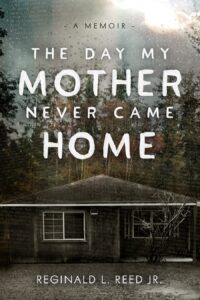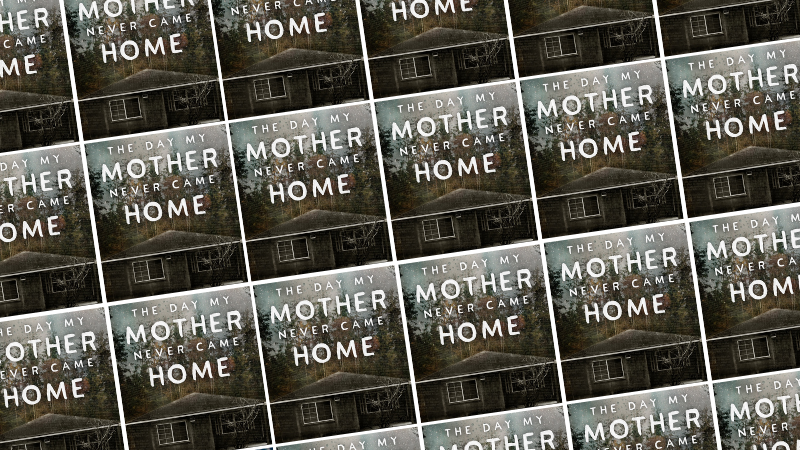
SAN ANTONIO, Texas – On Aug. 23, 1987, 26-year-old Selonia Reed was found dead in the parking lot of a gas station in Hammond, Louisiana. Nearly 40 years after her death, on Jan. 30, 2023, her husband Reginald Reed was sentenced to life in prison for her murder.
But that’s far from the entire story.
With unyielding candor, Selonia’s son Reginald L. Reed Jr. courageously navigates the trauma of his mother’s murder and the subsequent arrest and conviction of his father in his debut memoir, “The Day My Mother Never Came Home” (May 21, 2024). Through masterful prose, Reed skillfully navigates the complexities of pain, acknowledging its elusive and intangible nature. As the narrative unfolds — with the inclusion of raw crime scene details, never-before-seen evidence and gripping trial testimony — the author embarks on a courageous exploration, peeling back the layers of decadeslong trauma to reveal the raw wounds that lie beneath the surface.
The book transcends mere true crime storytelling, offering intimate anecdotes and a glimpse inside the process of grief. Through the author’s raw honesty and vulnerability, readers are drawn into a narrative that resonates on a universal level and is a must-read for anyone seeking solace and understanding in the face of loss. Interwoven with reflections on identity and the father-son relationship, the memoir explores the enduring bond between parent and child, despite deep complexity.
For those hungering for a narrative that lingers long after the final chapter, “The Day My Mother Never Came Home” serves as a poignant testament to the strength found in vulnerability, offering inspiration to all who have journeyed through the depths of grief and emerged on the path to healing.
“The Day My Mother Never Came Home”
Reginald L. Reed | May 21, 2024 | Memoir / True Crime
Paperback, 9788989711116, 19.99| Hardcover, 9798989711109, 27.99
About the Author
 Reginald L. Reed Jr. is an author and an accomplished professional in the pharmaceutical industry. He holds a master’s degree in business and global marketing. In his first book, “The Day My Mother Never Came Home,” Reed recalls the events surrounding the unsolved murder of his 26-year-old mother when he was just 6 years old and the indictment and trial of his father 32 years later. With raw honesty and transparency, the memoir sheds much needed light on losing a parent and the childhood trauma that results. Reed’s narrative style immediately draws the reader into his story — the roller coaster of emotions is captivating and what reads like a true crime novel is Reed’s actual life. He resides in San Antonio, Texas, with his wife, Paula, their son, Lathan, and daughter, Selonia.
Reginald L. Reed Jr. is an author and an accomplished professional in the pharmaceutical industry. He holds a master’s degree in business and global marketing. In his first book, “The Day My Mother Never Came Home,” Reed recalls the events surrounding the unsolved murder of his 26-year-old mother when he was just 6 years old and the indictment and trial of his father 32 years later. With raw honesty and transparency, the memoir sheds much needed light on losing a parent and the childhood trauma that results. Reed’s narrative style immediately draws the reader into his story — the roller coaster of emotions is captivating and what reads like a true crime novel is Reed’s actual life. He resides in San Antonio, Texas, with his wife, Paula, their son, Lathan, and daughter, Selonia.
Follow Reginald L. Reed on social media:
Facebook: @RLREEDII | TikTok: @rlreed0 | Instagram: @reginald_l_reed_ii
In an interview, Reginald L. Reed can discuss:
- How writing the book allowed him to reclaim his voice and shed light on the darkest corners of his life, empowering others to do the same
- Advice for those navigating trauma, especially young people and those in marginalized communities
- How the book transcends traditional true crime narratives and offers a nuanced exploration of the complexities of justice
- How the process of writing the book allowed him to process, grieve and move forward, as well as help others who are hurting
- The positive and negative effects of pop culture’s ever-increasing preoccupation with the true crime genre
- Why the literary community can benefit from elevating authors such as Reed, Kiese Laymon, Michael Todd, Saeed Jones, Bryan Stevenson and more who share their stories
An interview with Reginald L. Reed
1. What has it been like reading news stories about your mother’s death and father’s arrest, and did that inspire you to share your own narrative?
Reading the news stories about my mother’s death and my father’s arrest have been a profoundly disorienting and painful experience. It feels like my private grief and turmoil are being publicly dissected, which has led to feelings of vulnerability and exposure. However, the external narration of this tragedy also serves as a catalyst for reclaiming my own story. It inspired a desire for me to share my narrative, from my perspective, while providing an opportunity to add depth, context, and personal truth to the public discourse. By doing so, I was able to make powerful steps toward healing and empowerment.
2. In writing your memoir, how did you navigate the process of revisiting and recounting traumatic experiences, especially regarding events that occurred so early in your childhood?
Time and patience! Navigating and recounting the traumatic experiences, especially those from early childhood, often involved a delicate balance of introspection, emotional processing, and seeking support from therapists and trusted individuals within my small circle. It was essential to approach these memories with care, allowing myself the space and time needed to reflect and heal, and craft a narrative that honors my experiences while also respecting my emotional well-being. Additionally, incorporating techniques like meditation, mindfulness and self-care helped manage the emotional toll of revisiting such challenging memories.
3. How did you balance honesty and vulnerability while also respecting the privacy of those involved?
Balancing honesty and vulnerability with the privacy of others while writing, especially about sensitive personal experiences, involved carefully navigating the ethical considerations of storytelling. This process often included focusing on one’s own emotions, reactions and growth, rather than delving deeply into the private details of others’ lives without their consent. When mentioning others, it was important to consider their perspective and potential impact on them, possibly anonymizing identities or seeking their input. This approach allowed for a truthful recounting of events and feelings while maintaining respect for the privacy and dignity of all involved, whether good or bad.
4. Why was it important to you to include details like crime scene specifics and your mother’s autopsy report?
By including specific details such as the crime scene specifics and the autopsy report within the context of my memoir, it served several important purposes. First, my intention was to provide readers with a clear, unflinching look at the reality of the events, grounding the story in undeniable facts and allowing for a deeper understanding of the impact these events had on my life. Secondly, it helped in the process of confronting and processing the trauma, as writing about these details forced me to face the facts head-on, which was a crucial step in the healing process. Lastly, these specifics also contributed to the authenticity and credibility of my memoir, ensuring that the story is not dismissed as exaggerated or overlooked in its severity.
5. How has the process of writing this book impacted your own journey of healing and personal growth?
Writing this memoir about my personal trauma and the journey of healing has profoundly impacted my process of healing and personal growth. This process served as a form of therapeutic expression, allowing me to examine and articulate my deepest feelings and experiences in a structured way, which also led to new insights and provided a deeper understanding of my life and the experiences I was challenged with. It has also been empowering, allowing me to control the narrative, transforming my personal history of pain into a story of resilience and survival. Additionally, my purpose for sharing my story is to foster a sense of connection and support from readers who may have faced similar challenges, further reinforcing that there is life after trauma.
6. In what ways do you hope The Day My Mother Never Came Home will resonate with readers who have experienced trauma or loss?
I hope my memoir will resonate with readers who have experienced trauma or loss by providing them with a sense of companionship and understanding, making them feel less alone in their struggles. By sharing such a deep personal journey of facing and navigating through trauma and loss, the aim is to offer insights into the complexities of healing, showcasing both the vulnerability and resilience inherent in the human spirit. My story seeks to inspire hope and provide practical reflections on coping mechanisms and the nonlinear path of healing, ultimately encouraging readers to find their own strength and pathways to recovery in the face of adversity.
7. What do you think keeps men from writing memoirs and sharing their stories?
Several factors can deter men from writing memoirs and sharing their personal stories, often rooted in societal expectations and norms around masculinity. I believe there’s a fear of judgment, weakness or not living up to these societal standards that prevent men from exploring and sharing their emotional experiences in a public format like a memoir. Additionally, there may be concerns about how their personal revelations will affect their relationships and professional lives. I work in corporate america, therefore; I understand. However, there’s a growing recognition of the value in diverse stories and expressions of masculinity, encouraging more men to share their journeys and contribute to changing narratives around vulnerability and strength. I hope my memoir serves as a reminder to men, especially marginalized men, that sharing one’s story is far from weak, but the most powerful act one can undertake.
8. Can you share a favorite memory of your mother — something you’d like readers to remember her for?
One of my favorite memories of my mother that I’d like readers to remember her for is her incredible warmth and ability to make anyone feel at home. One of the ways she welcomed others was through her baking skills. Although our time together on this earth was short lived, I constantly hear from others that I was her pride and joy. There were very few times, if any, that I was not with her when seen out in public. I miss my mother and father; I wish so much that they were here to cheer me on in life and be grandparents for our son and daughter. Unfortunately, my cards were dealt from a different deck, but I am determined to use those cards and continue to go through life playing my best hand.
Download press kit and photos for The Day My Mother Never Came Home

A former award-winning journalist with national exposure, Marissa now oversees the day-to-day operation of the Books Forward author branding and book marketing firm, along with our indie publishing support sister company Books Fluent.
Born and bred in Louisiana, currently living in New Orleans, she has lived and developed a strong base for our company and authors in Chicago and Nashville. Her journalism work has appeared in USA Today, National Geographic and other major publications. She is now interviewed by media on best practices for book marketing.


